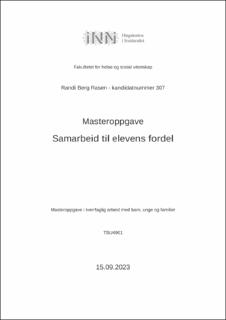| dc.contributor.advisor | | |
| dc.contributor.author | Rasen, Randi Berg | |
| dc.date.accessioned | 2023-11-18T17:10:27Z | |
| dc.date.available | 2023-11-18T17:10:27Z | |
| dc.date.issued | 2023 | |
| dc.identifier | no.inn:inspera:164568704:39201139 | |
| dc.identifier.uri | https://hdl.handle.net/11250/3103358 | |
| dc.description.abstract | Målet med denne studien er å undersøke hvilke erfaringer grunnskole ansatte, pedagogisk- psykologisk tjeneste (PPT) og helsesykepleier har med å arbeide med samarbeid rundt elever som har skolevegring. Studien tar for seg forståelsen av begrepet skolevegring, forebyggende tiltak mot skolevegring og tidlig intervensjon.
Problemstillingen er som følger:
«Hvordan kan ansatte i skolen redusere skolefravær? Kan PPT ha en mer aktiv rolle?»
Undersøkelsen er gjennomført med kvalitativ metode med semistrukturerte intervjuer av en helsesykepleier, en lærer, tre skolerådgiverer og to PP-rådgivere. Studiens empiriske funn blir presentert gjennom de fire hovedkategoreiene «systematisering av utarbeiding av rutiner», «manglende samarbeid», «for sent på» og «elevens stemme» som ble utarbeidet i analysen av datamaterialet.
Hovedfunnet i denne studien viser at de ansatte i skolen og PP-rådgiverne tenker ulikt rundt når PPT skal kobles inn i et samarbeid rundt elever som strever med skolevegring. De pekte at samarbeid mellom skole, helsesykepleier og PPT, kom for sent i gang og at det ble utfordrende å jobbe forebyggende tiltak. PPT tenker at de burde vært koblet på et tidligere tidspunkt, enn det de ansatte i skolen tenker. Et sentralt funn er at alle informantene ønsker et fast samarbeid i form av et tverrfaglig team. Et annet sentralt funn er at ansatte på skolen ønsket at PPT hadde fast tilstedeværelse på skolen, slik at de kunne bistå med å identifisere elever som ikke hadde nytt av felles tiltak. Elevens stemme, og kartlegging av årsaker til skolevegring trekkes frem som sentral for å finne løsninger. Det ble også trukket frem at skolen holdt på med å utarbeide en plan for å følge opp elever med skolevegring, men at den ikke var ferdig. Informantene snakket om at systematisk føring av fravær som en viktig forebyggende faktor, sammen med gode relasjoner. | |
| dc.description.abstract | The aim of this study is to investigate the experiences of primary school staff, the educational-psychological service (PPT) and public health nurses in working collaboratively around pupils who refuse to go to school. The study deals with the understanding of the concept of school refusal, preventive measures against school refusal and early intervention.
The problem statement is as follows:
"How can school staff reduce school absenteeism? Can PPT have a more active role?”
The survey was carried out using a qualitative method with semi-structured interviews of a public health nurse, a teacher, three school counsellors and two PP counsellors. The study's empirical findings are presented through the four main categories "systematisation of the development of routines", "lack of cooperation", "too late" and "student's voice" which were prepared in the analysis of the data material.
The main finding in this study shows that the staff in the school and the PP advisers think differently when PPT is to be associated in a collaboration around pupils who struggle with school refusal. They pointed out that collaboration between school, public health nurse and PPT started too late and that it was challenging to work on preventive measures. PPT thinks that they should have been connected at an earlier time, than what the school staff think. A key finding is that all the informants want permanent collaboration in the form of an interdisciplinary team. Another key finding is that staff at the school wanted the PPT to have a permanent presence at the school, so that they could assist in identifying pupils who did not benefit from joint measures. The student's voice and mapping of reasons for school refusal are highlighted as central to finding solutions. It was also revealed slowly that the school was preparing a plan to follow up pupils with school refusal, but that it was not finished. The informants spoke of systematic management of absences as an important preventive factor, together with good relationships. | |
| dc.language | nob | |
| dc.publisher | Inland Norway University | |
| dc.title | Samarbeid til elevens fordel | |
| dc.type | Master thesis | |
